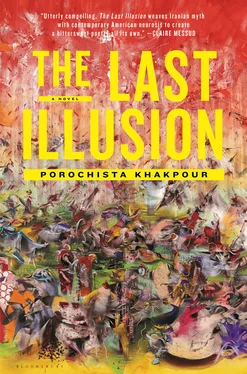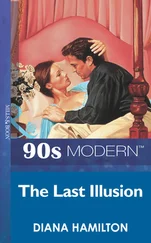Everything went quiet. No more violins, just the mere twinkling of the wind chimes plus a sparkle or two of xylophonics.
And the moving and blinding, Manning’s key to the illusion, commenced to a stream of genuine steady gasps — no gasp track this time; Silber had been that confident in the end — honest-to-God gasps from the thousands of spectators, who had little idea what was in store for them.
In this way, Silber was also a spectator among his spectators.
The last thing he remembered before the illusion took hold was the rehearsed thumbs-up — plus an extra congratulatory wink — from Manning in the wings.
Green light. A-OK. Ready-set-go, 3-2-1.
He waved his arms to the whole world, and the glitter-infused fog flooded the platform as planned.
And just like that it was gone—
Though not as planned.
There was to be three whole minutes between the disappearance and the reappearance. Silber took his position next to Manning at the wings, where the mirrors would be dropped and the rotation halted and the Towers would, to the relief of the audience, be restored.
But something was impossibly off.
“What the fuck is going on?” Manning growled at the controls. “What did you do? Is this some sort of last-minute addition, you motherfucker?”
But Silber, nowhere near comprehending, just shook his head, suddenly drenched in sweat, shaking like he’d never shaken before. He, like his audience, was gasping to the point of hyperventilating, but still unaware of the true enormity of it all.
By the end of the three minutes there was no denying it, no matter how hard they tried. “Oliver, it’s gone,” he whispered. “The towers are fucking gone.”
They relooped the music, which made little sense, violins flooding nothing but the audience’s multiplying unease and rippling impatience, a desperate cacophony struggling to patch up an inconsolably empty, gaping space, impossibility of impossibilities.
The illusion had not gone right, but it had not gone wrong, either. It had gone real .
For a while they faked it — more and more and more music, praying it could drown out the groans and protests and eventual full-fledged boos —but soon the police and fire trucks were involved. Soon there was yelling and screaming and the threat of riots, men and women insisting their loved ones were inside, and if you don’t bring them and it back, you’ll be gone too ; workers protesting the absence of their workplace, their livelihood, you fucking rich-bitch magician; a group of children at the command of their own morbid imaginations, hugging fire hydrants, lying atop the earth beneath them, crying for New York to please don’t away, please; dogs from all corners of the city suddenly howling like agonized women in an opera. And eventually everyone, including Silber Studios and company, was running for their lives.
And Zal — who in that instant of the magic’s reality felt like a character in a video game, one likely designed by his former lover — ran with them, if anything to ensure that no one would suspect his connection to a premonition that alone seemed to have given birth to this most sinister of all possible atrocities.
And he kept running, never stopping, until something fell in front of his face, bringing him to a halt. He jumped back, afraid of any and all possibilities, but he noticed it was simply a feather. A massive white feather, like the feather of a gull, but larger than any gull he had seen. He caught it and noticed part of it was singed.
He held it, held it against his heart.
For a moment he paused the whole scene, tried to write himself in, muscular and massive and a warrior, raised by an avian god, defender of kingdoms and homelands, a hero — but the light went out on the image as quickly as it had appeared. He focused on the freeze-frame of what was actually in front of him, all that was still and frozen, with Zal at the center of it all, thinking one thing: I exist. I am here. I am real.
And it had happened.

Zal had awakened to his own image, as if his own reflection had shaken him to consciousness. It was his face and body, but several stories high and wide and distorted to the point that he looked more monster than man.
He was before a giant mirror. New York was before a giant mirror. Mirror Room was the first thought that whispered itself into his brain. He was trapped in one large Mirror Room.
It was barely light, and there was Silber’s team, fussing with props and chairs and lights and, indeed, huge mirrors, on top of all sorts of foreign, futuristic-looking equipment. Zal had tried to make out Silber or Indigo or anyone else he knew, but he could see no one. Just a lot of efficient, angry, shouting guys, making something, something big, happen.
A police officer had tapped his shoulder just then, as if he’d been waiting for him to wake up. “Wakey-wakey, buddy,” he said. “This is off-limits.”
“I’m already up,” Zal said. “I don’t want to be here anyway.”
The police officer had already walked off, with bigger problems that morning than some pale guy in a suit, likely just another Wall Street banker who’d had a rough bender and made an accidental overnight of it.
Zal had started to walk off, but to where, he did not know. He suddenly felt worried, especially with his reflection ensnared among the mirrors, no matter how far he walked, it seemed. What was going to happen? Was he to stick around? Was he to leave? What was he to do? He suddenly had no idea. What was coming, anyway? He tried to conjure up that peaceful image of his swami girlfriend in her cage-cell, but suddenly he couldn’t see her. All he could come up with was a stick figure, crudely drawn, standing in for her. The only image he could see with any vividness was one he’d never seen: Willa, big beautiful Willa, standing upright for a brief moment and then walking, almost floating, to her bedroom window, and out.
And so he, still sore from the night’s walking, set to more walking, pacing even. As the day lightened into a big bright blue-gold, the crowds seemed even worse than they were during the evening rush hour. People were busier than ever, all their senses of purpose and destiny and fate entangled against his none-at-all.
He could not stop looking back at all that mirror.
He was lost.
Somewhere a second hand was ticking, madly, but he couldn’t hear it.
He had lost his nerve.
His body bobbed and lingered and ebbed in that crude indifferent reflection. He could not get rid of himself, that disdainful monster rendering, no matter what he did.
The next hour and a half was unrecoverable for him, a blur of walking, passing faces of all ages and genders and races and affiliations, at hyper-speed, being pushed and shoved, and yelled, helloed, and hissed at. It was a fever of city workday life. He could not get ahold of any of it. He wandered like a character in a dream, soulless, on someone else’s strings, waiting to evaporate with the waking of the dreamer.
Wake up, he thought, wake up. But to whom?
The suspense was killing him. Suspense was bad enough, but it was a horrible match for being lost.
And as he heard the Silber music in the distance — similar to the Flight Triptych, a bizarrely flashy dirge, slightly avant-garde, brassy, garish, heart-stopping, a chaos of orchestrals — he started to feel like he was getting closer.
And then, seconds before it, he felt the familiar sense of fate catching up with him, like sensing an earthquake seconds before it hits, and he felt himself go in and out and in and out until he was sure he was gone.
Читать дальше













